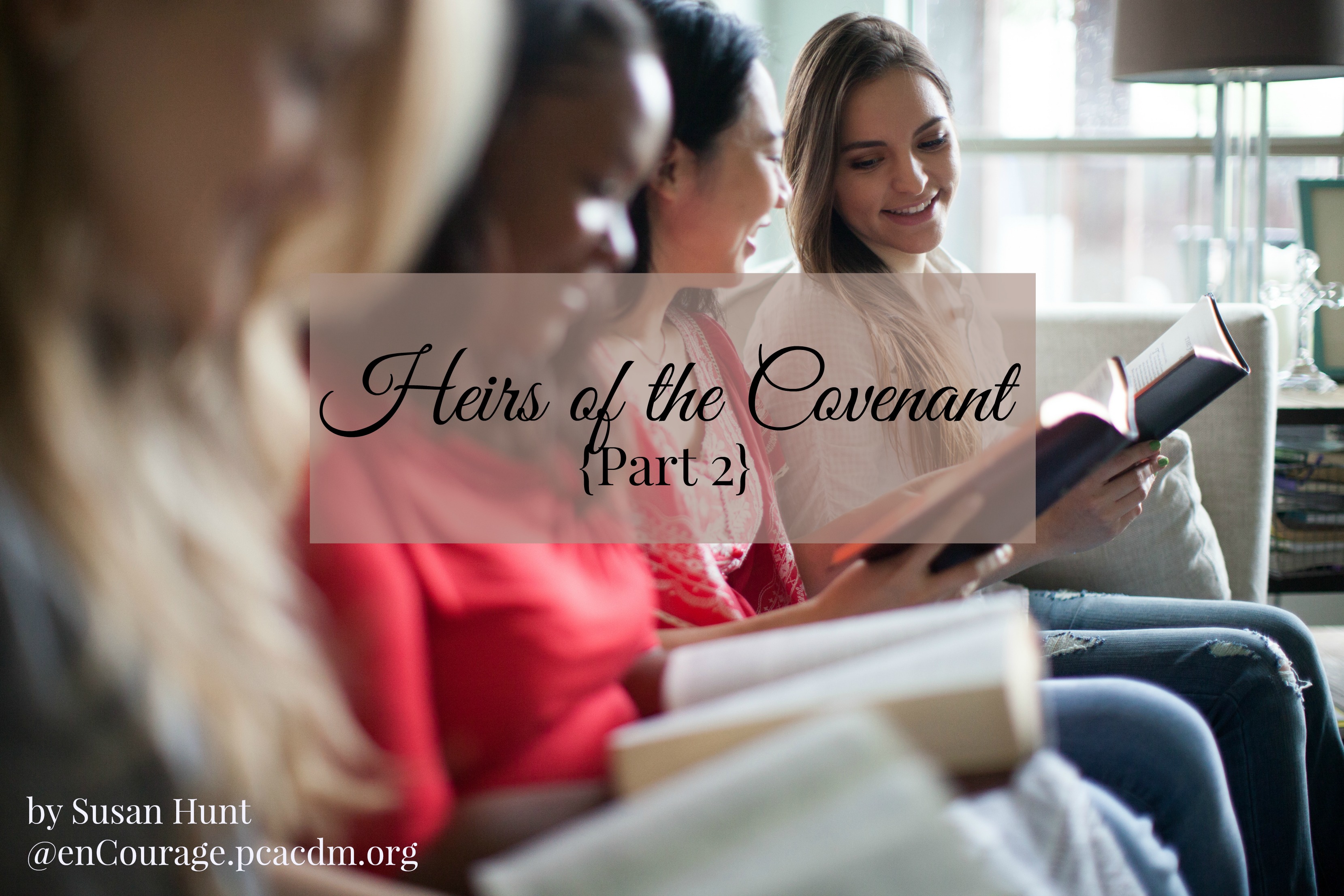SUSAN HUNT | CONTRIBUTOR
This is part 2 in a series of posts. The following excerpts are from pages 23-27 of Heirs of the Covenant.
When Heirs of the Covenant was written in 1998 our children were six and three years old and my husband and I were ministering in a young church plant. I read this book as an earnest mom seeking ways to disciple her children. I was challenged to think how we could, by God’s grace, live out the content of the covenant in the context of our little home and new church community. Two years later I was recruited to be a women’s ministry trainer and this book framed the curriculum we developed to help women think biblically and live covenantally in the home, church, and community. I am thankful the imprint of its timeless truths is still deeply impressed upon my life and ministry. — Karen Hodge
Place and Presence
Gene and I recently built a new home…We designed a house with lots of “gathering space” for our children and grandchildren. It was thrilling to watch the architect’s plans become a foundation, then a frame, and finally a house…But it is the presence of our family that makes the place wonderful.
Creation was the house. Adam and Eve were the children. God did not prepare the place and leave. He visited the place He prepared for Adam and Eve. He talked with them. The place was magnificently beautiful, but the splendor of it was God’s presence. His presence gave it purpose. His presence made it safe. His presence filled it with joy and love. His presence gave it life.
It was not man’s presence that made the place glorious. It was God’s presence.
The Covenant of Works
When God created Adam, He made a covenant with him. A covenant is a binding agreement with specific terms. The promise was God’s presence…The condition was perfect obedience… While Adam and Eve lived in God’s presence, they reflected His glory to one another and to creation. So they lived in harmony with one another and with creation.
But Adam ate the forbidden fruit. He broke covenant. His covenant-breaking severed his perfect relationship with God. Because God is holy, there can be nothing unholy in His presence. His holiness will consume anything unholy. Now when Adam and Eve faced each other, and when they faced creation, they reflected their own selfishness. Adam was our representative in the covenant agreement. The consequences of His covenant-breaking thundered through creation, through history, and into every human heart.
The Covenant of Grace
One night after hearing the story of Adam and Eve, our three-year-old grandson Mac prayed, “Dear God, please let Adam and Eve go back to the Garden.”
The good news is that God did just that… He made a way for them to return to His presence.
God was not obligated to do anything. He could have turned away from the creature and the creation. Instead He intervened. He came to the Garden. He called to the man. And He clothed Adam and Eve in garments of skin (Genesis 3:8, 9, 21). Here is the essence of the covenant of grace—God came, He called, He clothed. God comes to us while we are dead in our trespasses and sins (Ephesians 2:1-9). He calls us into a relationship with Himself (Acts 2:38-39). And He covers our guilt with the perfect righteousness of Christ so that we can once again live in His presence (Isaiah 61:10)—glorious, sovereign grace from beginning to end.
It has to be that way. The penalty of sin is death. And dead people can do nothing—absolutely nothing—to regain life.
As The Westminster Confession of Faith says:
The distance between God and the creature is so great, that although reasonable creatures do owe obedience unto Him as their Creator, yet they could never have any fruition of Him as their blessedness and reward, but by some voluntary condescension on God’s part, which He hath been pleased to express by way of covenant.
When God came to the Garden, He made a promise to the man, and He pronounced a curse upon Satan. “I will put enmity between you and the woman, and between your offspring and hers; he will crush your head, and you will strike his heel” (Genesis 3:15).
This was not the establishment of the covenant of grace; it was the revelation of that covenant… The covenant was not an afterthought. The divine agreement to redeem man was in place before man was created. Jesus, the Mediator and Head of this covenant, is the “Lamb that was slain from the creation of the world” (Revelation 18:8)… Neither were the beneficiaries of the covenant an afterthought. “For He chose us in Him before the creation of the world to be holy and blameless in His sight. In love He predestined us to be adopted as His sons through Jesus Christ, in accordance with His pleasure and will—to the praise of His glorious grace, which He has freely given us in the One He loves” (Ephesians 1:4-6).
Nineteen years later: We retired and built another home next door to the original house where our daughter and her family now live. We downsized everything except the “gathering space” which is actually larger because there are more grandchildren plus the anticipation of great-grandchildren! Living covenantally compelled this decision.
Reflections for Women’s Ministry
Do you think of God as a task-master who evaluates your performance, or as a loving Father who chose you, redeemed you, and delights in you because you are His?
When you think of His electing and redeeming and sustaining love, how does this affect your relationships and ministry?
What are some ways your women’s ministry can cultivate a welcoming environment where people are encouraged to gather and show His love to one another?


